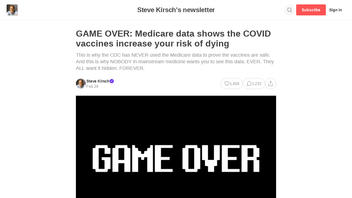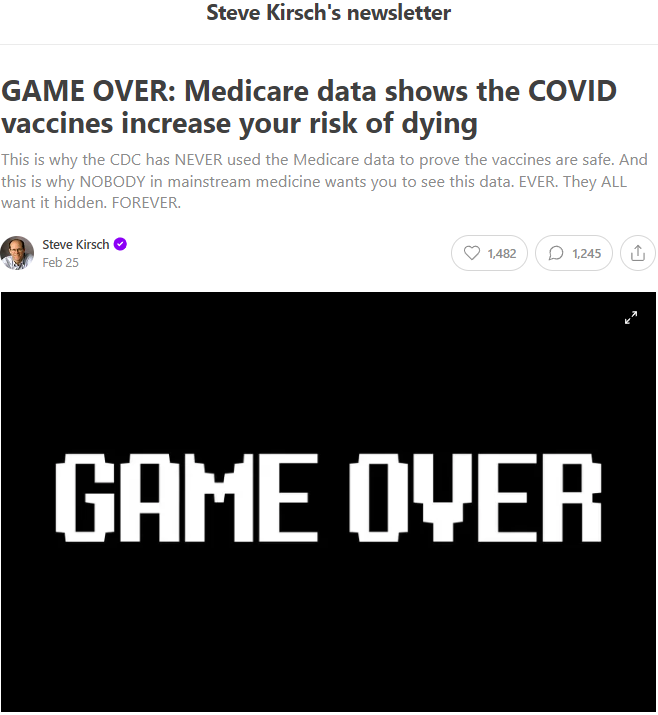
Do Medicare data show that COVID-19 vaccines increase your risk of dying? No, that's not true: "There is no credible scientific evidence that COVID-19 vaccines are causing excess deaths," or deaths that wouldn't have otherwise happened, the Centers for Disease Control and Prevention (CDC) wrote in a March 2, 2023, email. Such deaths are calculated by subtracting the expected number of deaths from the observed number of deaths, the CDC website says.
The claim appeared in a newsletter (archived here) published by Steve Kirsch on the self-publishing platform Substack on February 25, 2023, under the title "GAME OVER: Medicare data shows the COVID vaccines increase your risk of dying." It opened:
This is why the CDC has NEVER used the Medicare data to prove the vaccines are safe. And this is why NOBODY in mainstream medicine wants you to see this data. EVER. They ALL want it hidden. FOREVER.
This is what the newsletter looked like on Substack at the time of writing:
(Source: Substack screenshot taken on Thu Mar 2 19:01:20 2023 UTC)
Dr. Daniel Kuritzkes, the Division of Infectious Diseases chief at Brigham and Women's Hospital in Boston, told Lead Stories in a March 1, 2023, email that the Medicare data is being "selectively cited ... in the GAME OVER piece." His response continued:
I would say that the national mortality data (which are far more inclusive than the Medicare database) show a substantial reduction in COVID-related mortality after introduction of the vaccine. The GAME OVER people inaccurately state that most elderly had been vaccinated by end of January 2021--in fact, for most people in that demographic vaccination was just beginning, with many first getting their initial vaccine dose in February, March and beyond.
The first COVID vaccine in the United States was given emergency use authorization on December 11, 2020, and the first U.S. vaccination outside of a clinical trial took place on December 14, 2020.
Among the first people to get vaccinated were those believed to be most at-risk -- health care workers and long-term care residents. The second tier of vaccine recipients included people 65 and older and people with conditions that placed them at high risk for severe illness from the virus.
Centers for Disease Control and Prevention response
In its email to Lead Stories, the CDC said there's "no credible scientific evidence" that COVID vaccines increase your risk of dying as the newsletter suggests. The public health agency's response continued:
[The] CDC monitors vaccine safety using multiple, complementary systems (Vaccine Information and Safety Studies | Vaccine Safety | CDC). COVID-19 vaccines have been subject to the most intense safety monitoring in U.S. history and CDC has been timely, accurate, and transparent in communicating publicly about COVID-19 vaccine safety. CDC is not able to comment on the analysis presented in Mr. Kirsch's blog; however there are substantial data to support that COVID-19 vaccines protect against COVID-related death and that people vaccinated against COVID-19 are not at an increased risk of non-COVID-related death.
The CDC cited two papers to support its case:
- Reporting Rates for VAERS Death Reports Following COVID-19 Vaccination, December 14, 2020-November 17, 2021
- A safety study evaluating non-COVID-19 mortality risk following COVID-19 vaccination
Kuritzkes said in his email response that he has full faith in the safety numbers from the CDC:
... I am certain that the clinical trials data and the CDC data show that CDC did not lie to the public about [the] safety of the COVID vaccines and they do not cause an increase in death ...
Medicare response
Lead Stories also reached out to the Centers for Medicare & Medicaid Services (CMS) for its response to the claims in the Kirsch newsletter. In a March 2, 2023, email, a CMS spokesperson said the federal agency doesn't have data that would support the claims of his blog post.
Steve Kirsch background
Kirsch is a wealthy Silicon Valley entrepreneur who funded early research into COVID treatments but became a prominent anti-vaxxer hosting a website containing questionable data about coronavirus vaccines and promoting the use of unproven drugs that have not gained Food and Drug Administration approval for treating the disease.
Additional Lead Stories fact checks related to COVID vaccines can be found here.
Additional Lead Stories fact checks related to Steve Kirsch can be found here.


















